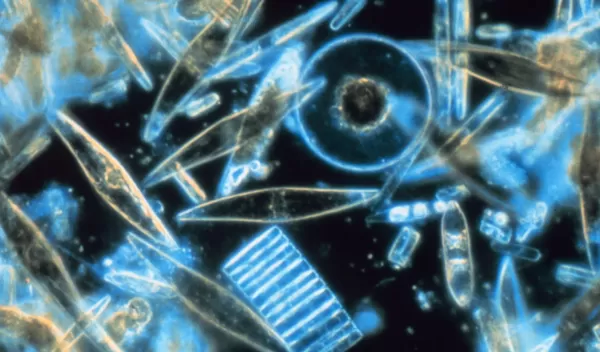
Journal Spotlights Research on Marine Microbes Funded by National Science Foundation
The Insight section of the May 14, 2009, issue of the journal Nature summarizes the current state of scientific knowledge on marine microbes. Entitled Microbial Oceanography, this section includes five review articles, each of which was either authored or co-authored by an NSF-funded researcher.
Microbial oceanography is a timely topic because microorganisms are "the smallest but arguably most important inhabitants of the ocean," according to the introduction to Microbial Oceanography. Nevertheless, "microbes are the life forms about which we know the least," says Mathew Kane, a program director at NSF.
NSF's Influence
The May 14 issue of Nature incorporates NSF-funded research in several important ways:
- "The five articles featured in Microbial Oceanography review transformative scientific and technical advances--virtually all of which were supported at least in part by NSF," says Kane.
- One of the driving forces for the production of Microbial Oceanography was a workshop that was partially funded by NSF. This workshop was entitled, "Implications and Opportunities of the Marine Genomics Revolution" and was held in Bermuda from October 29-30, 2007.
- In addition to spotlighting NSF-funded research in Microbial Oceanography, the issue features an article about unique and small microbial RNAs in the ocean's water column; this research was partially funded by NSF. This article, as well as two of the review articles included in Microbial Oceanography, are products of the Center for Microbial Oceanography: Research and Education (C-MORE), an NSF-funded Science and Technology Center.
Coverage of Microbial Oceanography
Microbial Oceanography provides an ideal resource for anyone seeking quick, comprehensive overviews of:
- The significance of marine microbes to Earth systems.
- An introduction to new techniques used by scientists to study diatoms, fungi, viruses, bacteria, plankton and other types of marine microbes. "This is a particularly innovative time for microbial research," says Kane "because various technical advances are now enabling researchers to decipher the genetic codes of entire communities of microorganisms, and determine, with unprecedented resolving power, the properties and activities of microorganisms on our planet."
- Potential responses by microbes to climate change, and the potentially dramatic impacts on Earth systems that may result from such responses. "Ongoing microbial research is providing the kind of information that science and society need to understand and to manage our changing Earth system, and the kind of information that will drive new discoveries relevant to energy sustainability," says Kane.
- Prospects for discovering new, unusual microbial species, habitats and interactions.
Written in a highly readable style, Microbial Oceanography is designed to be understandable to scientists and non-scientists alike. Indeed, nature enthusiasts of all stripes will be amazed by the cornucopia of facts about the abundance, ecological importance and diversity of marine microbes presented in Microbial Oceanography.
Featured Articles
The following articles are featured in Microbial Oceanography:
- Microbial Oceanography in a Sea of Opportunity by Chris Bowler of l'École Normale Supérieure in Paris, France and the Stazione Zoologica ‘Anton Dohrn' in Naples, Italy, David M. Karl of the University of Hawaii, Honolulu, and Rita R. Colwell of the University of Maryland, College Park. (Rita R. Colwell is a former NSF director.)
- The Life of Diatoms in the World's Oceans by E. Virginia Armbrust of the University of Washington, Seattle.
- Microbial Community Structure and Its Functional Implications by Jed A. Fuhrman of the University of Southern California, Los Angeles.
- The Microbial Ocean from Genomes to Biomes by Edward F. DeLong of the Massachusetts Institute of Technology.
- Viruses Manipulate the Marine Environment by Forest Rohwer of San Diego State University and Rebecca Vega Thurber of the Florida International University.


